by Liz Ligawa
Her name is Olivia. And six years ago, she was expected to be born this month.
I was finally enjoying a stress-free day. After just wrapping up classes for this semester, I allowed myself to enjoy some respite from academic rigor by scrolling, unthinkingly, through my Facebook newsfeed. As I scrolled, I laughed…smiled…blocked (you just have to do that sometimes), and then suddenly stopped. NPR was seeking feedback on their Facebook page about what people “wished others knew about miscarriage”. I stared blankly at the screen of my iPhone, and felt uncomfortably, unnervingly bare. “How did this find me?” I wondered as tears rolled at pace with sighs. I tried to continue scrolling down as if I never saw the post. I looked for things that were funny. I looked for things that were cute. I looked for anything that would help me escape from dealing with the dynamite that had so casually been laid in my lap. This escape I could not find.
Our society has carried a message pretty well. The message we have historically been exposed to is one that makes womanhood synonymous to motherhood. Even a woman’s age is labeled with respect to having children- “child-bearing age”. The moment we become engaged, we start receiving inquiries regarding if we will have children. As soon as we sashay down the aisle, we are asked when we will have children. As soon as the first child is out, we are asked when we will have another. It seems to never end. Now, I am not against women, or children, or women having children, I just wonder what message we are sending to ourselves and other women when motherhood is not a part of our story.
I never expected to no longer be expecting. I did not anticipate the certainty of loss. As the news that I was carrying ignited applause, the fact that I miscarried would be silently observed. Unfortunately, I received this silence as a directive since I also did not know how to respond.
I scrolled back to the NPR Facebook page. I did not have a plan for what I would do once I got to the page. I was not even sure if I wanted to contribute to the survey. I just knew I had to go back. I cautiously started to view the comments that were listing. I wondered what truths would register in my heart, but also feared the shame that could also be exposed. Comment after comment, they kept on coming. Line upon line, they took ownership of space. One after the other, they told a story, and expressed truth. Post, after post, after post: Grief. Shame. Uncertainty. Self-Blame. Disbelief. Scorn. Fear. Rejection. Loss. Loss. Loss. I recognized my story. I recognized myself. What I did not understand is why we discuss this loss in such muted terms. Why do we whisper these wounds? Is it wrong to suffer loss?
As a newlywed, I was told that I would have plenty of time to try for more. As an expectant mother, I just wanted my baby.
As I looked at the commentary, I started to wonder how much our society’s view of womanhood and motherhood had to do with our personal experiences of loss. Should grief be automatically flanked by guilt and shame? If motherhood and womanhood were not used interchangeably, could we appreciate each more? If I am a woman, is it okay not to be a mother? My personal experience of guilt and shame were founded on the belief that having a child was as simple as being a woman. It is just not true. Some of the women who have impacted my life the most are those without birth children, or who have experienced loss of a child. I consider myself a part of them, and I am deeply privileged to be one of theirs.
In considering how I could listen more closely to others so that I may hear their whispered wounds, I learned that I first must bear witness to my own. When I ran across the Facebook post, it had been a year since I had spoken Olivia’s name, and just as long in acknowledging that pain. In this way, I am thankful for the survey.
So, on this day that mothers are celebrated, I am mindful of the mothers who have suffered loss; I am respectful of the dear ones who long to mother; I am honored by the ones who mother alongside me; and I am grateful for the ones who mother me.
Olivia
I grieve the first one of my womb
With hidden words
And muted hues
Silently and underneath
The uninquiring pleasantries
Stifling questions held the applause
Of things to be, now just what was
And memory’s unforgiving stare
Credits me for what’s not there
I grieve in syncopated breaths
When stillness fills the room
I grieve in smiles and how-do-you-dos
When still is gone too soon
We spread the news too soon I guess
But even those who knew
Are scared to hear or tell of you
The first one of my womb
-Liz Ligawa
If this post spoke to you because of a personal experience of miscarriage, stillbirth, early infant loss, or infertility, you may be interested to learn about Cradled by Love, Hope and Healing an organization in Waco that offers individual support as well as weekly peer support groups.
 This post was written by Liz Ligawa. Liz is a graduate student of Baylor University where she has found the perfect expression of her community-centered heart in the MDiv/MSW degree program. With a concentration on Community Practice, she is also the adoring mother of one son, Elijah, who prefers to be regarded in public as Spider-Man. She may be reached at [email protected].
This post was written by Liz Ligawa. Liz is a graduate student of Baylor University where she has found the perfect expression of her community-centered heart in the MDiv/MSW degree program. With a concentration on Community Practice, she is also the adoring mother of one son, Elijah, who prefers to be regarded in public as Spider-Man. She may be reached at [email protected].
The Act Locally Waco blog publishes posts with a connection to these aspirations for Waco. If you are interested in writing for the Act Locally Waco Blog, please email [email protected] for more information.
By Matthew Polk
This is an exciting time to live in Waco. Downtown revitalization, Baylor football in McLane Stadium, Fixer Upper, food trucks…the list of great things about Waco is long and growing. There is a refreshing energy that comes from living in a place that is growing and seeing success. Everyone wants to be part of a winning team.
Most of us would agree that when a community grows and prospers, the benefits spill over to all of the community members in one way or another. A revitalized downtown means a more beautiful city, more places to shop and eat, more jobs. A winning sports program means more exciting entertainment options and visits from College GameDay. Local TV celebrities give us something to talk about with strangers on the airplane when we tell them we’re from Waco, TX. In other words, when Waco wins, we all win. This idea seems to make sense to most people.
But how often do we flip that idea on its head and look at it from another perspective? How often do we think about the fact that, when one Wacoan benefits, it’s good for the rest of us? It’s easy to see that when the community as a whole is flourishing there are benefits for us individually—sometimes it’s harder to see how one person’s success can lead to benefits for the rest of the community (unless that person happens to be named Art, Bryce, Chip, or Joanna).
Prosper Waco is about the idea that for the community of Waco to flourish, Waco’s citizens and families have to flourish. It’s about the idea that the more successful we are individually, the stronger we will be as a community. We have a special opportunity to seize the momentum Waco has and harness it in a way that benefits all members of our community. Prosper Waco is about making sure that all Wacoans have a chance to capitalize on our recent success and, by doing so, to contribute to the growing momentum.
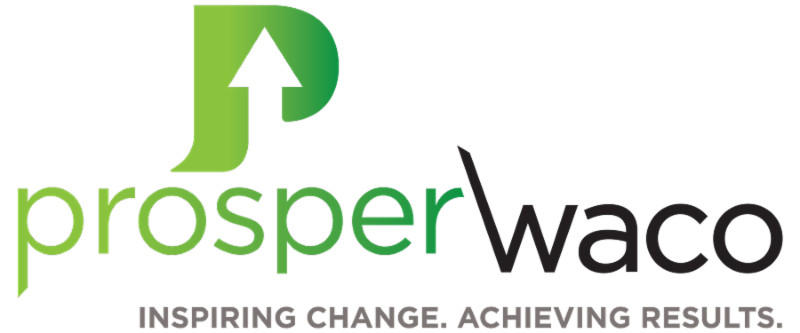 So what is Prosper Waco? Simply put, it’s a community-wide initiative to make Waco a better place for all of us to live. More specifically, our mission statement is “to build an environment in which all people can measurably improve their education, health, and financial security.” Education…health…financial security. They are intertwined in all our lives. Our educational achievement affects our job prospects, which affects our health, which affects our financial security…and so on.
So what is Prosper Waco? Simply put, it’s a community-wide initiative to make Waco a better place for all of us to live. More specifically, our mission statement is “to build an environment in which all people can measurably improve their education, health, and financial security.” Education…health…financial security. They are intertwined in all our lives. Our educational achievement affects our job prospects, which affects our health, which affects our financial security…and so on.
But how do you go about helping people improve their education, health, and financial security throughout an entire community? These are big, complex areas of life with lots of moving parts and many issues to consider. In order to make positive changes in these areas, a community has to agree on some goals that we can work toward together. This approach is called collective impact—a community working together to achieve goals that will benefit everyone.
If more children are academically and socially prepared to begin Kindergarten, our schools will be stronger. If more students (especially students from economically-disadvantaged backgrounds) complete a college certificate or degree, we will have a more dynamic workforce, which means our economy will grow, more jobs will be available, and more businesses will thrive. If more people in Waco have access to primary healthcare, our local hospitals will not need to provide millions of dollars a week (a week!) in uncompensated care and will be able to provide even better care for everyone. If more young people find a job, they will have a better chance of establishing a career that will provide their family with financial security and boost the local economy.
To achieve any of these things will take a coordinated effort from all of us.
So who is us? Who is Prosper Waco? You are…so are your family, your friends, your co-workers, classmates, and fellow church members. Prosper Waco is all of us pulling in the same direction to achieve some very big, very ambitious goals that will benefit everyone because more of us will be succeeding on an individual level. Prosper Waco is non-profits, businesses, churches, schools, and government agencies aligning their services and communicating about how they can work together to achieve common goals and better serve the community.
How can you be Prosper Waco? How can you get involved? Here are some ways:
- Talk to your neighbors and friends about Prosper Waco and what you’d like to see change for the better in our community. We are all the “grassroots” that will make this community-wide initiative work, and it will take people connecting with other people to make sure that Wacoans are able to make the most of the opportunities that develop out of this initiative.
- If you are a community member who has always wanted to be part of making Waco better but didn’t know where to start, call us and we can help you find volunteer opportunities with great local organizations.
- If you are a “big picture” person with a strategic mind, we’d love to have you join our steering committees to help develop community-wide strategies for achieving our goals.
- If you lead a local organization (non-profit, business, church, etc.) and want to coordinate your efforts with others to achieve common goals, give us a call or click on the Prosper Waco Affiliate logo at www.prosperwaco.org to indicate your organization’s interest in joining this movement.
If you’d like to learn more about Prosper Waco, give us a call at 741-0081, or visit us on the web, Facebook, or Twitter. #IamProsperWaco, and so are you. Together, we can build a Waco that works for all of us.
 Matthew Polk is Executive Director of Prosper Waco. Prior to that, he served as Superintendent of Rapoport Academy Public School. He and his wife attended Baylor, and after spending a few years in the northeast, they returned to Waco to raise their family. They have four children, ages 8 to 3 months. You can contact him at [email protected].
Matthew Polk is Executive Director of Prosper Waco. Prior to that, he served as Superintendent of Rapoport Academy Public School. He and his wife attended Baylor, and after spending a few years in the northeast, they returned to Waco to raise their family. They have four children, ages 8 to 3 months. You can contact him at [email protected].
The Act Locally Waco blog publishes posts with a connection to these aspirations for Waco. If you are interested in writing for the Act Locally Waco Blog, please email [email protected] for more information.
by Crystal Melton
Four weeks ago I welcomed baby number four into my arms and into the world. I’m biased, but this little person that I’ve been given the privilege to raise is absolutely perfect. However, I realize that feeling is universal among parents. We gaze in awe at the unblemished miracle we’ve been given, and, with the best of intentions to maintain that perfection, we make lofty promises in an effort to keep that child as healthy and well as we can.
Promises like “I’ll never let the television babysit my child” or “I will never feed my child fast food.” And sometimes the promises aren’t about what we’ll never do, but what we’ll always do. “I’ll always take time to play hide-and-seek with my child” or “I’ll always find time to push my child on the swing.”
I’ve made those same promises. I don’t know about you, but life and the chaos that it brings seem to always get in the way. I’ll admit it: I’ve counted on cartoons to occupy my children on more than one occasion, and, yes, a trip through the drive thru has rescued us more than once. And, sadly, at times work expectations have come between me and that game of hide-and-seek with my child.
Parents, you’re not alone. We all have the best of intentions with our children, but sometimes we don’t quite accomplish what we set out to do. An occasional upset to those promises probably won’t derail their health, but a constant lifestyle of those choices definitely could begin to send your child down the path of poor health. Although we don’t need to beat ourselves up about it, we do need to open our eyes and see what’s happening to our kids and their health and begin to reapply ourselves to those goals we may have once set.
According to the Centers for Disease Control, in 2012 one in three adolescents was overweight or obese. The reality surrounding those numbers is sobering because what we are seeing with this increase in bodyweight is an increase in risk factors for heart disease in our youth, such as high cholesterol and high blood pressure. This increase in body mass also puts them at risk for prediabetes, bone and joint problems, sleep apnea and poor self-esteem. And all those risks are present right now during their youth- in the past, these problems didn’t occur until people aged! Today’s kids head into adulthood ahead of the curve when it comes to being at risk for heart disease, diabetes and some forms of cancer.
After you’ve digested that, let me reassure you that we can help our kids get their health back on track. It’s not too late to help lead your child to a life of health and well-being. Programs, such as MEND, can help you and your child learn to change behaviors and make healthier choices. MEND (Mind, Exercise, Nutrition, Do It!) is a free 10-week program that meets twice a week that helps children ages 7-13 who are above their healthy body weight learn about nutrition, physical activity, goal setting and more. Together, parent and child move through an engaging research-based curriculum that not only educates the family but also often reduces tension and stress at home surrounding food and activity. The lessons include fun, thought-provoking activities, like a supermarket tour where kids get to be MEND detectives, finding healthy food options on the shelves of the grocery store. Each meeting also includes a fun, progressive, noncompetitive, game-based physical activity session. Another one of the endearing things about this program is that you’re diving into this material and making these lifestyle changes with other families that are struggling to be healthy, too. There is support, accountability and shared ideas among parents and children.
Finding the help you and your child are looking for is no farther than the YMCA of Central Texas. The MEND program is offered several times throughout the year. Space is limited, though, so you’ll want to sign up soon. Remember: lots of parents just like you want a healthier future for their child. For more information call the DORIS MILLER FAMILY YMCA at 254 752 1605 or WACO FAMILY YMCA at 254 776 6612.
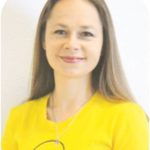 This Act Locally Waco blog post was written by Crystal Hernandez. Crystal is the Healthy Living Director for the Waco Family YMCA. She received her degree in Exercise Science and Health Promotion from the University of Memphis. She and husband Shawn are blessed to be the parents of 4 beautiful children. In her free time, she loves hitting the pavement and pounding out a good run.
This Act Locally Waco blog post was written by Crystal Hernandez. Crystal is the Healthy Living Director for the Waco Family YMCA. She received her degree in Exercise Science and Health Promotion from the University of Memphis. She and husband Shawn are blessed to be the parents of 4 beautiful children. In her free time, she loves hitting the pavement and pounding out a good run.
The Act Locally Waco blog publishes posts with a connection to these aspirations for Waco. If you are interested in writing for the Act Locally Waco Blog, please email [email protected] for more information.
by Sara Beth Stoltzfus
Being a parent can be tough. Returning to the role of parent as a 65 year old can be exhausting.
Now, I do not know this from personal experience. I am a 28 year old childless woman. I know this from what I have seen and heard from the grandmas and grandpas I have worked with through the Methodist Children’s Home (MCH) Family Outreach Grandparents as Parents Program (GAPP).
The Grandparents as Parents Program offers supportive in-home services to grandparents raising their grandchildren. The program includes case management, information and referrals for community resources, workshops, assistance with legal issues, and support groups.
Through this program, I have had the privilege of walking alongside young grandparents, older grandparents, grandparents with money, and grandparents with almost no income at all. Some grandparents come to our program seeking legal support, some because they are not making it financially, and some come because their grandchildren have been through so much physical and emotional trauma that they are constantly battling the problem behaviors that result. Some grandparents are just looking for someone to talk with, vent with, and cry with…someone to let them know that they are not alone.
All are coming to our doors because they love their grandchildren.
More and more grandparents are raising their grandchildren. In the United States, approximately 5.8 million children are living in grandparent homes. Similarly, almost 2 million children are living in the home of other relatives. (AARP, 2015). The AARP writes that grandparent caregivers and the children they are raising are frequently isolated. “They lack information about the range of support services, resources, programs, benefits, laws and policies available to help them successfully fulfill their caregiving role.” (AARP, 2015).
Grandparents serving as parents face a whole range of issues that the typical parent may not face. The U.S. Census found that grandparents living with a grandchild in 2012 were more likely to face poverty than those who did not live with a grandchild (Williams, 2012). A 2013 article in the Washington Post cited that 20% of grandparents raising grandchildren are living in poverty (Bahrampour, 2013). Grandparents are often not financially prepared for children to enter their home. This means they often have to take on a second, or even third job to pay for their grandchildren’s needs. Sometimes grandparents quit jobs that they once had in order to be able to adequately care for a child with special needs. While there is some financial help available for grandparents in specific situations, there is not enough financial assistance as many of these families need to feed growing children and themselves. Grandparents are also not getting any younger and often have health issues of their own to deal with. These financial and physical health challenges are highly prevalent amongst grandparents raising grandchildren. The need for greater support for these courageous grandparents is significant.
One of the greatest joys of working with the GAPP Program is facilitating a support group for these grandparents. I love watching one grandparent light up with deep understanding as another grandparent shares their story. I feel great satisfaction hearing a grandparent say they no longer feel so alone. Grandparents serving as parents are dealing with a lot of emotions. They shed tears regularly over their adult child’s drug addiction, another child’s domestic violence charges, the death of an adult child and the many other reasons their grandchild is staying with them. They wish for more for their adult children, but they work hard to set boundaries in order to keep their grandkids safe. Every story is different, but none is without complications.
Many grandparents feel very blessed to have a second chance to parent again. They know they’ve learned lessons over the years. They are often more patient the second time around. While the journey is not easy, most grandparents I’ve talked to feel very blessed by the entrance of their grandchildren into their lives.
We need to support our grandparents serving as parents. They are spending their golden years running around with toddlers, staying up into the night with a traumatized 8 year old, and learning to use a computer for the first time in order to relate to their teenage grandchild. All of the grandchildren that come to live with their grandparents have experienced some type of trauma. This is often trauma the grandparents are not prepared to address. Grandparents as parents need not only programs, such as GAPP and support groups, but a community of support. Grandparents as parents are indeed unsung heroes to our communities’ children.
One quote I often share with the grandparents I work with is:
“The more healthy relationships a child has, the more likely he will be to recover from trauma and thrive. Relationships are the agents of change and the most powerful therapy is human love.” –Bruce Perry
This quote also inspires and strengthens me in this work.
If you know a grandparent you would like to refer to our program or would like more information, please call 254-750-1263.
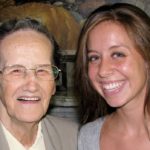 This Act Locally Waco blog post was written by Sara Beth Stoltzfus. Sara Beth is a case manager at the MCH Family Outreach office through the Methodist Children’s Home. Sara Beth received her master’s degree in Social Work from the University of Texas at Austin. Sara Beth is originally from Pennsylvania but has been living in Texas for almost 6 years, 4 of which have been spent in Waco.
This Act Locally Waco blog post was written by Sara Beth Stoltzfus. Sara Beth is a case manager at the MCH Family Outreach office through the Methodist Children’s Home. Sara Beth received her master’s degree in Social Work from the University of Texas at Austin. Sara Beth is originally from Pennsylvania but has been living in Texas for almost 6 years, 4 of which have been spent in Waco.
The Act Locally Waco blog publishes posts with a connection to these aspirations for Waco. If you are interested in writing for the Act Locally Waco Blog, please email [email protected] for more information.
By Ashley Bean Thornton
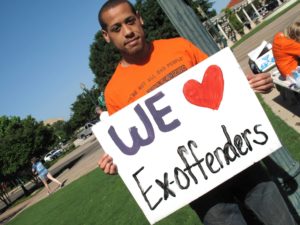 For several years now I have been a part of a conversation in Waco about how to help people returning to our community after incarceration to “reintegrate” into society. (Please visit the McLennan County Reintegration Roundtable website for more information about this on-going work.) One of the key elements for successful reintegration is employment. As you can imagine it is very difficult for an ex-offender to get a job interview much less a job. One idea that is being discussed to help formerly incarcerated individuals get work is “Fair Chance Hiring.” Fair Chance Hiring policies remove the questions about criminal history information from a job application. This change allows employers to judge applicants on their qualifications first, without the stigma of a criminal record. Questions about criminal history are moved later in the process. The idea is that if an employer has had a chance to examine the qualifications of the applicant, and possibly meet the applicant, that employer would be more likely to give the applicant a chance at a job. According to a flyer I received recently from Mission Waco representatives, 13 states have embraced this policy and around 70 cities and counties. On Saturday, April 25, 2015, several organizations in Waco including Mission Waco, Mission World and students from the Tarleton State University Social Work program worked together to hold a rally to advocate for Fair Chance Hiring. I was one of the speakers at the rally. Here are the thoughts I tried to share. Thank you for considering this important idea. – ABT
For several years now I have been a part of a conversation in Waco about how to help people returning to our community after incarceration to “reintegrate” into society. (Please visit the McLennan County Reintegration Roundtable website for more information about this on-going work.) One of the key elements for successful reintegration is employment. As you can imagine it is very difficult for an ex-offender to get a job interview much less a job. One idea that is being discussed to help formerly incarcerated individuals get work is “Fair Chance Hiring.” Fair Chance Hiring policies remove the questions about criminal history information from a job application. This change allows employers to judge applicants on their qualifications first, without the stigma of a criminal record. Questions about criminal history are moved later in the process. The idea is that if an employer has had a chance to examine the qualifications of the applicant, and possibly meet the applicant, that employer would be more likely to give the applicant a chance at a job. According to a flyer I received recently from Mission Waco representatives, 13 states have embraced this policy and around 70 cities and counties. On Saturday, April 25, 2015, several organizations in Waco including Mission Waco, Mission World and students from the Tarleton State University Social Work program worked together to hold a rally to advocate for Fair Chance Hiring. I was one of the speakers at the rally. Here are the thoughts I tried to share. Thank you for considering this important idea. – ABT
My written remarks for the Fair Chance Hiring Rally (They don’t exactly match what I ended up saying, but pretty close!) :
One of the most challenging things about living together in a community is balancing the needs and wants of various groups within the community while also keeping in mind what’s good for the whole community. When we find a tool that can help us do this, we need to consider it seriously. I think this fair chance hiring notion is just such a tool, and I support it. I want to speak for just a moment about how I came to that conclusion. I want to talk for just a little bit about how the practice of asking about criminal history a little later in the hiring process can balance the needs of formerly incarcerated job seekers with the needs of employers who are hiring – and how it can benefit our whole community.
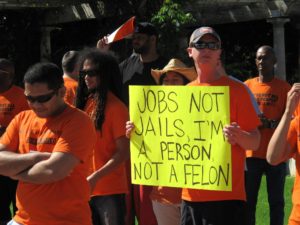 I’ll start with what I believe is good for the whole community. I believe it is good for the whole community for as many of us who can work, to be working. When more of us are working and earning a good income, it benefits the economy of our whole community – more people are buying things and making investments in their homes and more people are paying the taxes that pay for our community amenities. On the other hand, when some people cannot get work because of whatever barrier, whether it be lack of transportation or child care or education, or – as in the example we are grappling with today — a personal history that includes incarceration – it is bad for all of us. It hurts our economy and reduces the pool of resources available to our community. It does not do us any good as a community to have a whole group of people who find it difficult, if not almost impossible, to find work. When more people in our community are working, we are all better off. I believe moving questions about criminal history a little later in the hiring process will result in more people finding work, and I think that will be better for all of us.
I’ll start with what I believe is good for the whole community. I believe it is good for the whole community for as many of us who can work, to be working. When more of us are working and earning a good income, it benefits the economy of our whole community – more people are buying things and making investments in their homes and more people are paying the taxes that pay for our community amenities. On the other hand, when some people cannot get work because of whatever barrier, whether it be lack of transportation or child care or education, or – as in the example we are grappling with today — a personal history that includes incarceration – it is bad for all of us. It hurts our economy and reduces the pool of resources available to our community. It does not do us any good as a community to have a whole group of people who find it difficult, if not almost impossible, to find work. When more people in our community are working, we are all better off. I believe moving questions about criminal history a little later in the hiring process will result in more people finding work, and I think that will be better for all of us.
Next I would like to talk about the group of people who make up this population of formerly incarcerated individuals. Certainly no one doubts it is a benefit to them to be able to find work. We all need money to live. The best way to get money is to have a legal job. If that pathway is closed to you, then what options do you have? You can depend on your family – whose resources more often than not are already stretched to the breaking point. You can start your own business if you have the resources and personality to do that. Or, really, what else can you do? Add this financial reality to the psychological stress of being rejected for work at every turn, and you can see we have an environment that makes it very difficult for a person returning from incarceration to successfully reintegrate into our community. Moving questions about criminal history to a little later in the hiring process at least gives formerly incarcerated people a fighting chance to make their case, to put their best foot forward, to explain why what they CAN do is worth considering. It doesn’t give them a guarantee of a job – none of us have that – but it at least gives them a chance, a foot in the door, to finding a job that will allow them to contribute to our economy.
Finally, I would like to talk about this from the point of view of an employer. I have been an employer. I have had the job of trying to hire the best person for a job as quickly as possible. I know first-hand the expense and aggravation of making a bad hire. And I will admit that as an employer I first thought that getting rid of “the box” – the little check box on the application where a person indicates that they have made some mistakes in their past – was a bad idea.
My resistance was based on a desire for efficiency – when I am in hiring mode I don’t want to waste my time. I want to weed out bad candidates and focus only on good candidates. That little box seemed like an easy way to eliminate unsuitable job seekers. What I have learned is that, like with most things, the easy way is not always the best way.
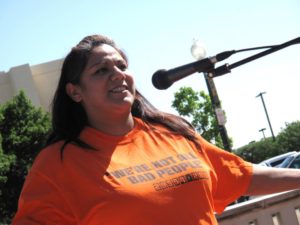 First of all, just because a person doesn’t check the box, that doesn’t mean they are going to be a stellar employee. There are plenty of people out there in the job market who have all kinds of problems that impinge on their ability to be good employees – drinking problems, drug problems, all kinds of problems – just because someone’s problems haven’t resulted in a conviction doesn’t mean they are a perfect angel. Just because a person doesn’t check the box doesn’t mean they have never done anything wrong. The absence or presence of a checkmark in that box doesn’t tell me this person will be a good employee and that person won’t. When it gets right down to it, hiring is somewhat a game of chance. That little checkmark really doesn’t give you as much useful information as it seems like it might at first glance.
First of all, just because a person doesn’t check the box, that doesn’t mean they are going to be a stellar employee. There are plenty of people out there in the job market who have all kinds of problems that impinge on their ability to be good employees – drinking problems, drug problems, all kinds of problems – just because someone’s problems haven’t resulted in a conviction doesn’t mean they are a perfect angel. Just because a person doesn’t check the box doesn’t mean they have never done anything wrong. The absence or presence of a checkmark in that box doesn’t tell me this person will be a good employee and that person won’t. When it gets right down to it, hiring is somewhat a game of chance. That little checkmark really doesn’t give you as much useful information as it seems like it might at first glance.
Second, I have learned through listening to employers who make it a practice to give formerly incarcerated individuals a chance that giving someone a chance can be a good step toward developing a loyal, hard-working, long term employee. Make no mistake – when I am hiring, it is not my goal to be a charity institution. It is my goal to get the best employee for the job. If I can get myself a good, loyal, hardworking, long term employee by giving a motivated person with good skills a chance, why wouldn’t I want to do that? That’s good for me and good for my organization.
I would not support a policy of not being able to ask about criminal back ground at all – certainly as a hirer I would want to know about past behavior. Some crimes will certainly disqualify some people from some jobs. But, if I weed people out because they checked a box before I ever met them, then I am missing out on some potentially good employees. If I talk to someone, find out about their skills, get a sense of their motivation and work ethic, and then find out about the mistakes of their past and what they learned from those mistakes – I can make an informed decision.
I have come to believe that fair chance hiring practices are potentially a benefit to employers as well. Yes, it may take more time in the hiring process – moving the question about past mistakes until later in the process, giving people a chance to make their case, takes more time than throwing away an application that has a check mark in the wrong place. But, finding a great employee is a beautiful thing. If time spent in the hiring process results in a great employee – regardless, or maybe even because of, the mistakes in their past – it saves time in the long run. We have employers in Waco who are reaping this benefit right now because they are willing to give people a chance. I believe it would be a benefit to the employers, to the formerly incarcerated individuals and to our whole community if more would do so.
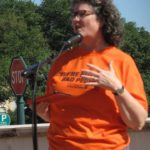 This Act Locally Waco blog post is by Ashley Bean Thornton, the Manager of the www.www.actlocallywaco.org website and the editor of the Friday Update newsletter. The Act Locally Waco blog publishes posts with a connection to these aspirations for Waco. If you are interested in writing for the Act Locally Waco Blog, please email [email protected] for more information.
This Act Locally Waco blog post is by Ashley Bean Thornton, the Manager of the www.www.actlocallywaco.org website and the editor of the Friday Update newsletter. The Act Locally Waco blog publishes posts with a connection to these aspirations for Waco. If you are interested in writing for the Act Locally Waco Blog, please email [email protected] for more information.
by Gary Lee Webb, DTM
Do you have trouble getting through a job interview? Are you uncomfortable speaking in front of people you do not know? Would you like to be better at responding to a surprise question? Or better at marshalling your thoughts and presenting your ideas? Perhaps you have a job, but wish to move up to a supervisory position? Or perhaps, you just wish to be a better speaker/presenter at church, work, or other organizations?
If any of these apply to you, Toastmasters International can help. Toastmasters is an international non-profit organization. We are 300,000 people helping people to learn how to communicate better, and we have been doing it for 90 years. Toastmasters offers participants a way to practice communication skills in a supportive environment, a way to meet more experienced speakers and see them in action, and a way to expand one’s horizons across the world. We are a self-paced program, with helpful, individual mentors, usually divided into chapters of roughly 20 people, generally meeting weekly or bi-weekly (see directions below on how to get info on local chapters). There is high level training available for those who want it,
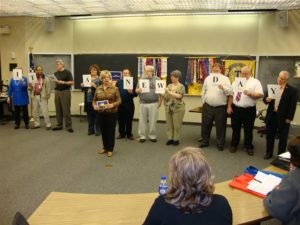 Toastmasters provides a very friendly environment in which beginners can learn, in front of a non-critical audience, that speaking is not hard. Participants go on to learn basic presentation skills, and, as they improve, gain the confidence that they are capable and even excellent speakers. They can either participate in a group (Speechcraft) or learn at their own pace (with a mentor); either way they will get positive criticism, aimed at helping them improve. As they practice, they will periodically see more experienced presenters (at club, contest, or conference), which may help guide their steps to being a better presenter. Eventually, participants discover that it does not matter whether the audience is friendly or not – they know they speak well.
Toastmasters provides a very friendly environment in which beginners can learn, in front of a non-critical audience, that speaking is not hard. Participants go on to learn basic presentation skills, and, as they improve, gain the confidence that they are capable and even excellent speakers. They can either participate in a group (Speechcraft) or learn at their own pace (with a mentor); either way they will get positive criticism, aimed at helping them improve. As they practice, they will periodically see more experienced presenters (at club, contest, or conference), which may help guide their steps to being a better presenter. Eventually, participants discover that it does not matter whether the audience is friendly or not – they know they speak well.
At the same time they are learning public speaking skills, participants are also learning how to handle those surprise questions, learning to marshal their thoughts, and how to respond well. This is a valuable skill particularly in an interview. Interviewers often resort to surprise questions, to see how the applicant responds. A sage response after brief thought could be the key to getting the job.
Toastmasters also develops leadership skills: listening, evaluating, organizing your thoughts, speaking in a way that you are believed, persuasive, or inspirational…in short, getting your message across and convincing people of its wisdom…these skills are a strong foundation for any leader. Participants also learn useful skills like organizing and running a meeting well, or putting together and managing a major project. I know people who used their new skills to get that supervisor position they wanted.
This is our mission statement: “We provide a supportive and positive learning experience in which members are empowered to develop communication and leadership skills, resulting in greater self-confidence and personal growth.” I believe we do it very well indeed: I have seen people become great speakers, authors, and leaders. It is a deep and wide program, with many options for learning and participation.
Members who wish to hold the highest honors demonstrate what they have learned by teaching others. As participants grow in the program they have opportunities to teach new speakers in Speechcraft, teach teenagers in Youth Leadership, teach management skills, and to teach leaders or trainers, as well as many other options. Not all of these are required, but I have done several to my benefit. I can proudly say I am a Distinguished ToastMaster (DTM), signifying I have delved deeply into the program, learning both communication and leadership.
What makes Toastmasters especially valuable is not just the practice, but the immediate feedback and the good role models. The manuals not only train the speaker, they guide the evaluator in what to look for, so that he may better tell the speaker how to improve. And after 90 years of improvement, the manuals are very good.
Moreover, the member will see better speakers to emulate. If the ones in his or her chapter are not good enough, there are other chapters to visit. Twice per year, there is a series of contests, in which members can compete against members from other chapters. The contest winners compete across larger regions, and then across the state. The international contest climaxes with the winner from each of the almost 100 districts world-wide competing in semi- and world finals. Last year (2014), I saw D.J. Swinyar win in the District 25 contest and get flown to Malaysia for the 2014 finals. Contests are optional, only about 10% of members compete, but those who are interested can learn, just by watching. There are also many other optional training opportunities.
In short, Toastmasters is a unique opportunity to improve oneself: as a speaker, as a leader, and in many other ways. The skills are valuable, and so are the friendships. We generally do our best to help each other out, and we tend to be willing to meet and network across the globe. I have become acquainted with astronauts, top businessmen, world champions, and great authors; I personally know toastmasters in three continents. The basic cost is $72 per year (prorated for a partial year); individual chapters may add local dues (there are seven chapters in the Waco area). And there is a $20 initial fee for a new member (pays for the initial manuals). That is incredibly cheap compared to other options for this kind of development. Toastmasters is a very cost-effective way to learn.
I hope you will consider coming and visiting one of our chapters – guests are always welcome. If you like what you see, if you think it will help you grow into a more capable person, I hope you will consider joining. For details of when and where we meet, you can e-mail me at [email protected] or check out the international web site, www.toastmasters.org, and put in your zip code after clicking “Find a Club” on the top bar.
 Gary Lee Webb is a 17-year resident of Waco. He recently completed a successful year as a president’s distinguished Division Governor for Toastmasters International, guiding 29 central Texas chapters. His credits include film chairman for the 1982 West Coast Science Fiction Convention, over 360 public speeches, assisting at both high school and adult speech contests, and over 40 publications (14 fiction). He is 59, married 38 years, with 4 daughters.
Gary Lee Webb is a 17-year resident of Waco. He recently completed a successful year as a president’s distinguished Division Governor for Toastmasters International, guiding 29 central Texas chapters. His credits include film chairman for the 1982 West Coast Science Fiction Convention, over 360 public speeches, assisting at both high school and adult speech contests, and over 40 publications (14 fiction). He is 59, married 38 years, with 4 daughters.
The Act Locally Waco blog publishes posts with a connection to these aspirations for Waco. If you are interested in writing for the Act Locally Waco Blog, please email [email protected] for more information.
By Alicia
What comes to your mind when I say Autistic? Who do you picture in your head? Perhaps a child in your neighborhood who flaps their hands with happiness? Or an adolescent who gives you a detailed account of the solar system’s activities? Maybe the adult from church, who rocks back-and-forth during most services?
Perhaps you have heard that autism is a spectrum. But what does that mean? Autism is a developmental disability and another way of being in the world. To describe behavioral traits common to autistic people, we begin with the medical model, the DSM-5 entry for autism spectrum disorder (APA, 2013, pp. 50-51).
– Social communication impairments
– Restricted and/or repetitive behavioral patterns
**********************************
But this entry isn’t complete. It describes what autism looks like, but fails to describe the everyday lives of Autistic individuals. I lapse into academic language when I try to write about autism from a perspective other than my own. I attempt to describe autism in behavioral terms, rather than lived experiences, and get lost in this phrasing.
It is no easier to write about autism from a clinical perspective. For me, the personal is academic. I began reading about autism because I wanted to better understand my friend from undergraduate studies, a young woman with Asperger syndrome.
***************************************
“Many of us will become interested in psychology and the helping professions along the way, either because of our diagnosis or in search of it. We find we want to nurture and help others in their journeys because we know how hard it can be.” ~ Rudy Simone, Aspergirls
Perhaps I am in-between these spaces — the personal and the academic. Not entirely ready to come out, for fear I might be wrong about myself. For the past two years, I’ve read autism blogs and books, immersed myself in the online Autistic community, and befriended women like me. We are writing a narrative of what #AcceptanceMeans.
*****************************************************
Becoming (not finding) yourself is neither a linear, nor coherent process. In the spring of 2013, I first acknowledged my Autistic traits. I remember reading Rudy Simone’s book, Aspergirls. I took copious notes, surprised how the experiences she described resonated with my own.
With the support of the women in my writing circle and like-minded women online, I continued to explore this narrative through research and poetry. April is Autism Acceptance Month. Perhaps acceptance begins with myself.
*****************************************************************
How long will I have to mince my words? You see, I have these traits – I’m 85 to 95% sure that this is who I am. I’ve lived in euphemistic dialogue for some time now…
I’m socially different, sensory sensitive; missing gist for detail. This is who I am, regardless of how you choose to see me, label me. We sustain ourselves in these Voldemorty spaces – that which shall not be named.
I’m autistic. Not that you’ll believe me. We’re unicorns. The highly verbal, completely awkward, often confused. I’m not a 12-year-old boy who likes trains. Does that surprise you? It shouldn’t.
My passions are information gathering, sorting, and sensemaking. That’s why I’m here today. I brought a list of all the things you might think are wrong with me – I prefer different. This is merely a collection of traits – some of which get me stuck. Please don’t medicalize me, marginalize me.
This is new to you. Not to me – I’ve been this way my entire life – just hadn’t found my coherent narrative. Hadn’t imagined there were others like us, rising in dust and hashtagging it – dialoguing across countries and timezones. Other women like me, yet utterly alien in their own spaces.
We are developing our own dialogue, a shared narrative – together. I see us in a decent-sized room, sitting at a table, offering virtual cups of tea.
Remembering.
Verbalizing.
Being.
In this created space – creative space. We are ourselves, with little explanation. Needing no one else to fill in our gaps. We are our own. Here anyway. Coda. Yet this space, although not enough, is a starting point. Free from labels or to label as we wish. Existing together in a shared collage of narratives.
Of course this text-based medium would serve us well. Free from constraints of nonverbals and missed cues.
We are here in this place. We fit. We belong. And we are enough. Together.
 Alicia is a graduate student at Baylor University. She writes for reasons both pragmatic and personal. She became involved in the Waco arts community through In the Words of Womyn – Heart of Texas.
Alicia is a graduate student at Baylor University. She writes for reasons both pragmatic and personal. She became involved in the Waco arts community through In the Words of Womyn – Heart of Texas.
For more information about Autistic women, visit Autism Women’s Network (http://autismwomensnetwork.org).
For general autism resources, visit Autism Society (http://www.autism-society.org) and Autistic Self Advocacy Network (http://autisticadvocacy.org)
Local programs for individuals on the autism spectrum include:
- Heart of Texas Autism Network (http://www.hotautismnetwork.org)
- ARC of McLennan County (http://www.wacoarc.org)
- Baylor Center for Developmental Disabilities (http://www.baylor.edu/bcdd/)
The Act Locally Waco blog publishes posts with a connection to these aspirations for Waco. If you are interested in writing for the Act Locally Waco Blog, please email [email protected] for more information.
References:
American Psychiatric Association. (2013). Diagnostic and statistical manual of mental disorders (5th ed.). Washington, DC: Author
by Dawn Wible
- A friend blankly stares across the table while you check your texts. As she anxiously awaits an answer, you have no idea what she just said.
- Your four year old is describing his new friend at school, but you are busy scrolling through the newsfeed and missing the whole story.
- Vegging on the couch was the agenda for the night but instead you are responding to a work email at 11:15pm, because really, what are “work hours” these days anyway?
We have all found ourselves in these situations, myself included. It truly is a sign of the times.
The two questions I ask myself are: “Why am I choosing to put my relationships on the back burner?” and “When and where is the best time to be on my device?” I believe we do not even realize we are making these small and influential choices. Statistics and studies are actually showing a change in our brain function due to technology addiction. Many neurologists and psychologists are pointing to our dependence on technology as the root of many mental, physical, emotional, spiritual, social and relational issues. These issues range from poor academic or job performance, to job loss, lack of social connectedness, sleep disorders, divorce and in some cases even death.
There’s a crucial conversation happening in our culture concerning the problem of tech addiction, and my family and I want to be a part of the solution! This idea has become so important to the mental health of my family that we started a local movement: Talk more. Tech less.
Talk More Tech Less is for myself, and essentially anyone who uses technology in this tech heavy culture. This is not an anti-technology movement; it is a pro-relationship movement. I’m a mom of three BOYS and technology is very much a part of my family’s life. But, we struggle with the overuse and addiction that causes tantrums, irritability, ignoring, zoning out…you get the picture. Like most of you, my phone is my home and work computer in hand. It helps me to be efficient – way more efficient than I would be without my device. It is valuable, but it also distracts me from the life going on right in front of me. I realized a few years back that I needed to shift my perspective and priorities. I saw it not only in my own life, but in society as well. We can get lots of information, facts and communication from our phones, but what we’re missing is the emotion, the conversation, and the connection that should come with communication.
Talk More Tech Less was birthed from mentoring and spending time with teenagers. My husband, Matt, runs a Waco based organization called Field Guides that mentors young men through outdoor activities. We have seen first- hand the benefits of getting young men away from all the distraction and overuse of technology, video games, smart-phones and computers and getting them outside! As the CRC Health Group says, “There is a strong body of research confirming that direct contact with nature increases mental health and psychological and spiritual development. Benefits include stress reduction, a sense of coherence and belonging, improved self-confidence and self-discipline, and a broader sense of community.”
At Field Guides summer camps we have participants take one-week breaks from their phones. Working with these guys year after year our eyes have been opened to some true dependency issues involving technology. We have also been privileged to see the breakthroughs that happened as they embraced this process. With those experiences as background I began researching tech dependency and addiction stats and saw the great need in this culture for balance and freedom.
Last summer we had the campers construct boxes for their phones. We encouraged them to take the boxes home and use them with their families. The idea is that family members place their phones in these “Detox Boxes” during meal times and other important moments during the day and night.
Our own family’s experience with technology balance, my research into this subject, and the success of this “detox box” idea convinced me that other people could benefit from a structured way to explore and reduce dependency on technology. That led me to create the Talk More Tech Less 30 Day Experience. The 30 day experience is designed to strengthen relationships and create awareness about the overuse of technology. It is a guide to empower individuals, families, and groups to find balance, leading to greater connection. I hope it will help those who use it gain control of this growing concern in our culture and world.
The 30 Day Experience includes a custom made “Detox Box”, 30 daily note cards, a journal and a decal. The box is created to place our devices in during strategic times throughout the day. They are locally crafted here in the 254, by Sticker Universe and Hole in the Roof Marketing. The daily note cards are a true journey to healthy technology usage. Each card takes approximately 90 seconds per day, so as not to take up time, but to give it back. Those involved are actually surprised at how much time they have on their hands during the 30 days.
Research shows negative effects from the lack of face-to-face, eye contact, physical, spiritual and emotional contact. In the 30 Day Experience we pool all that information and combine it with practical ways to deal with and replace this dependency issue. Talk More Tech Less is designed to bring conversation and connection back to our culture. We’d love you to be a part of this movement! For more information please visit us at www.talkmoretechless.com
 Dawn Wible is the creator of Talk More. Tech Less. She is a Waco resident and graduate of Baylor University. Her husband, Matt founded and runs an outdoor ministry, Heart of Texas Field Guides, that mentors young men through outdoor activity. Together they raise 3 amazing boys, Levi, Jude and Ty. Dawn finds life in deep connection with family and friends, volunteering, kayaking, cooking, jogging and she loves a good party.
Dawn Wible is the creator of Talk More. Tech Less. She is a Waco resident and graduate of Baylor University. Her husband, Matt founded and runs an outdoor ministry, Heart of Texas Field Guides, that mentors young men through outdoor activity. Together they raise 3 amazing boys, Levi, Jude and Ty. Dawn finds life in deep connection with family and friends, volunteering, kayaking, cooking, jogging and she loves a good party.
The Act Locally Waco blog publishes posts with a connection to these aspirations for Waco. If you are interested in writing for the Act Locally Waco Blog, please email [email protected] for more information.
By Cecelia Rodriguez
Do you have an older friend, or perhaps a friend with a disability, who is on a limited income? Booth Garden Apartments might be the perfect home for him or her. We are proud of the environment we have created here at Booth Gardens, and we would like to make sure that those who might need a place like Booth know that it is here for them.
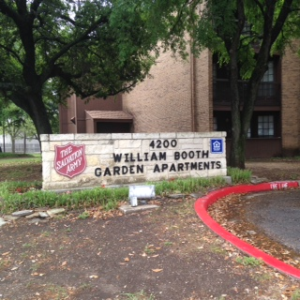 The Booth Garden Apartments are an independent housing community owned and managed by the Salvation Army. We provide safe and comfortable living conditions at affordable costs for seniors, and those with federally defined disabilities, who have limited incomes. At Booth Garden Apartments, residents can live in an atmosphere of love, acceptance and encouragement.
The Booth Garden Apartments are an independent housing community owned and managed by the Salvation Army. We provide safe and comfortable living conditions at affordable costs for seniors, and those with federally defined disabilities, who have limited incomes. At Booth Garden Apartments, residents can live in an atmosphere of love, acceptance and encouragement.
The Booth Gardens Apartments are one-connected building, but they are actually two separate projects: William Booth (which faces N. 19th) and Catherine Booth Garden Apartments (which faces Stewart Dr.). William Booth was first opened for occupancy in 1983 and Catherine Booth was later opened for occupancy in 1997.
 The buildings are four stories high, and together contain 196 one bedroom apartments. The apartments include added amenities especially designed to benefit our two target audiences: persons 62 years of age or older, and persons 18 or older who have a federally defined disability. William Booth is for those who are 62 years of age or older and also for those that are at least 18 years of age with a federally defined disability. Catherine Booth is just for senior citizens, 62 years of age or older.
The buildings are four stories high, and together contain 196 one bedroom apartments. The apartments include added amenities especially designed to benefit our two target audiences: persons 62 years of age or older, and persons 18 or older who have a federally defined disability. William Booth is for those who are 62 years of age or older and also for those that are at least 18 years of age with a federally defined disability. Catherine Booth is just for senior citizens, 62 years of age or older.
We contract with HUD (U.S. Department of Housing and Urban Development) which provides subsidized rent for our residents. The apartments are reserved to be safe, comfortable homes for people with limited income. Annual income limitations (which are subject to change annually) are currently $19,150.00 per year for a single person and $21,900.00 per year for couples. The exact rent charged is based on a formula which takes into account the residents’ adjusted gross income, assets and medical expenses.
Here are some of the things residents appreciate about living at Booth Gardens:
- A group of our residents have formed a very active “Tenant Council” which meets monthly. They lead numerous activities ranging from trips to lunch fundraisers and are continuously working to be a voice for our residents.
- We offer a variety of activities including weekly bus trips to H-E-B and Walmart.
- There is a 24 hour response system in case of emergencies. Emergency pull-cords are available near the beds and in the bathrooms of each apartment and can be put to use in case of a medical emergency.
- Multi-faith groups come-in to conduct spiritual programs. We also enjoy a variety of educational programs hosted by local home healthcare agencies.
- We have a resident chaplain, Major Harvey Harwell. He leads regular Bible studies and devotion times and offers counseling to those who need it.
- Our resident services coordinator, Mrs. Barbara Parnell, is also available to help residents meet their own needs.
- Domesticated pets are welcome.
- We have a total of 3 laundry facilities.
- Although we are independent living, many of our residents have private contracts with home-health care agencies that enable them to remain independent.
- We have a partnership with “Meals and Wheels” program which provides lunch meals to our residents three days a week.
- Friends for Life is a partner and has helped some of our residents meet financial management and budgeting needs. This also helps them to stay independent longer.
It has been an honor and a pleasure to serve with The Salvation Army Booth Garden Apartments for the past 10 years. I cherish every moment participating in and assisting with housing for senior citizens. Several years ago I lost my mother, who was disabled, and shortly after, an elderly aunt. They are my inspiration for being part of this wonderful ministry. Like many others, they were on limited means of income, and faced health challenges. They struggled to maintain the aging, deteriorating home in which they lived. We hope that our residents are able to be as independent as possible, for as long as possible and receive the dignity and respect they deserve in a safe and affordable home. If you know someone who is looking for a home who you think might be a good fit for the Booth Gardens, please contact us! You may contact me, Cecilia Rodriquez by email at [email protected], or our Assistant Director, Rachel Sheridan at [email protected], or call either of us at (254) 757-2242. We look forward to hearing from you!
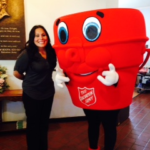 This Act Locally Waco blog post is by Cecilia Rodriquez. Cecilia began her ministry with The Salvation Army Booth Gardens Apartments as the receptionist 10 years ago and is now the Director of both properties. She is a Certified Manager of Housing and Certified Occupancy Specialist through the National Center for Housing Management. She has a passion for senior citizens and also enjoys being an active part in her children’s lives coaching in her spare time. She is family-driven and thrives on helping to make a difference in people’s lives as she carries out the mission of The Salvation Army.
This Act Locally Waco blog post is by Cecilia Rodriquez. Cecilia began her ministry with The Salvation Army Booth Gardens Apartments as the receptionist 10 years ago and is now the Director of both properties. She is a Certified Manager of Housing and Certified Occupancy Specialist through the National Center for Housing Management. She has a passion for senior citizens and also enjoys being an active part in her children’s lives coaching in her spare time. She is family-driven and thrives on helping to make a difference in people’s lives as she carries out the mission of The Salvation Army.
The Act Locally Waco blog publishes posts with a connection to these aspirations for Waco. If you are interested in writing for the Act Locally Waco Blog, please email [email protected] for more information.
By David Saucedo
The Reinforced Earth Company is a precast concrete company that is part of a national and international conglomerate comprised of construction, technology and concession companies, among others. We are located in China Springs and we employ between 150 to 160 people, many of which are Waco residents.
My personal passion for community change and empowerment has played out in many ways over the last four to five years, but the last two years have been amazing! When I was hired at Reinforced Earth in 2013, I never thought the most enlightening and fulfilling work so far would take place at this company, but it has. I was blessed with opportunities, and I advanced to become the Safety Coordinator in late 2013. This promotion opened doors that I would have never imagined and allowed me to work with some terrific people who have taught me a great deal about what we call “foundational employment” – employment that is foundational to a stable lifestyle.
The Reinforced Earth Company’s Waco plant, managed by James Ashley, is paving a new road in employee development. We focus on a quality made product, produced in a timely manner, as safely as possible. But most importantly we are aiming to promote healthy and stable lifestyles to the men in our community that work here. From a business perspective, it goes without saying that a high turnover rate interferes with those goals and makes it very hard to establish maximum efficiency. In 2014 our company on average employed 58 workers per month through local staffing agencies. This not only increased the cost of producing our product, but it also led to a workforce with less experience and more potential for mistakes or injuries.
We began our work in foundational employment by using encouraging messages in our safety toolbox meetings. For example, we would use words like, “This is a family out here,” or “We want you to use Reinforced Earth as a foundation for your family.” We encouraged car pools to help employees who didn’t have transportation, showing that we are here to help. We introduced simple budget spreadsheets and encouraged employees to ask how they could escape the check-to-check lifestyle. Our most recent, and I think our most fruitful step has been referring and encouraging our employees to a local psychiatrist that is covered by our insurance. In some cases we even covered the copay for employees who are more serious about improving their standard of living.
I’m very proud to report that this month we will be reporting that fewer than 20 employees are working at Reinforced Earth through local staffing agencies. We have increased production and decreased our production hours by improving our production procedures and focusing on better training and efficiencies. By no means would our efforts be considered a comprehensive study, but we are seeing results and we associate these results with the investments we are making in our employees.
From these experiences, I’m very confident that a company dedicated to promoting strong foundations in the lives of their employees will see improvements in the quality of their workforce, a decrease in their turn over, a reduction in overhead, and — the icing on the cake — an increase in their profits. What would our community look like if more companies were encouraged to promote strong and healthy foundations in the lives of their employees? That’s a question I have been asking myself more and more.
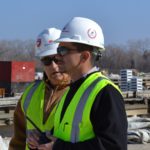 This Act Locally Waco blog post was written by David Saucedo. David is a local minister with Life Church Waco and has committed the last 8 years of his life to impacting his community in a positive way. David has a loving wife, Michelle and three beautiful children, Lianna (7), Isaiah (4) and Isaac (10 Months).
This Act Locally Waco blog post was written by David Saucedo. David is a local minister with Life Church Waco and has committed the last 8 years of his life to impacting his community in a positive way. David has a loving wife, Michelle and three beautiful children, Lianna (7), Isaiah (4) and Isaac (10 Months).
The Act Locally Waco blog publishes posts with a connection to these aspirations for Waco. If you are interested in writing for the Act Locally Waco Blog, please email [email protected] for more information.

